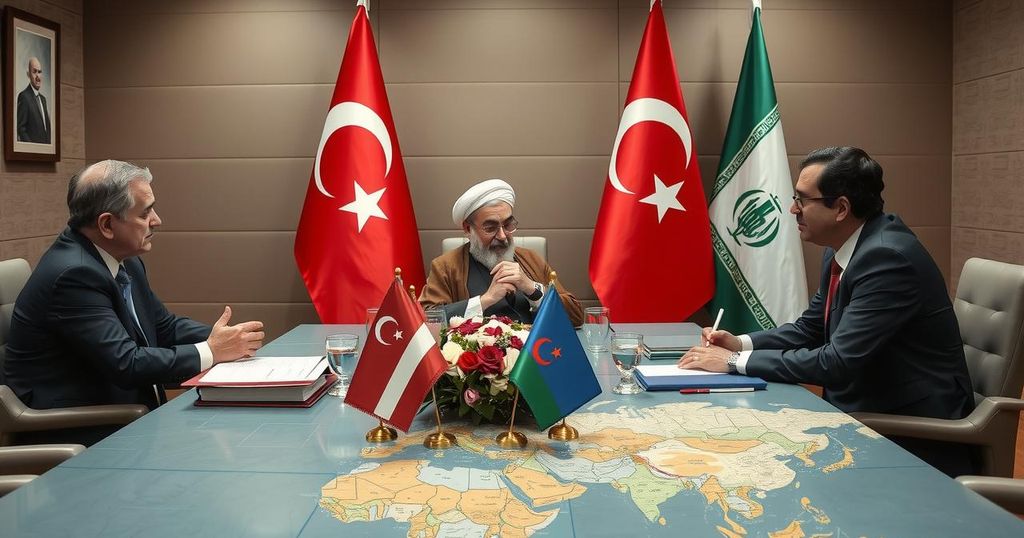Iran Strengthens Economic Ties with Turkey and Egypt Through D-8 Meetings

Iran’s Foreign Minister Abbas Araghchi met with Turkish and Egyptian officials in Cairo during the D-8 Organization of Economic Cooperation meeting, aiming to enhance economic collaboration and forge stronger ties within non-Western alliances. The meetings emphasize Iran’s strategic shift towards working with countries outside of Western influence, amidst ongoing discussions of support for Palestine.
On Wednesday, Iran’s Foreign Minister Abbas Araghchi engaged in discussions with his Turkish and Egyptian counterparts, Hakan Fidan and Badr Abdel Aaty, respectively, during a meeting in Cairo associated with the D-8 Organization of Economic Cooperation. This gathering highlights the strategic connection between Iran and nations traditionally aligned with Western interests, such as Turkey and Egypt, while consistently excluding Israel from such dialogues.
The assembly included representatives from Iran, Egypt, Turkey, Pakistan, Indonesia, Nigeria, Malaysia, and Bangladesh, forming a significant coalition known as D-8. Iran is actively pursuing broader economic collaborations, aiming to integrate itself into global blocks like BRICS and the Shanghai Cooperation Organization (SCO), thereby reinforcing its alliances with non-Western nations.
Moreover, Iran’s President Masoud Pezeshkian’s arrival in Cairo underscores the significance Iran attributes to this diplomatic engagement. In addition, Araghchi held talks with Pakistan’s Deputy Prime Minister and Foreign Minister, Mohammad Ishaq Dar, emphasizing the positive trajectory of bilateral relations and the continual rise in political and economic exchanges between Iran and Pakistan. This meeting marks the third interaction between the two foreign ministers within a two-month period.
Dar articulated support for the Palestinian cause during discussions, reaffirming Pakistan’s longstanding position regarding solidarity with the Palestinian people. Such assertions highlight the intersection of political ideologies and collaborative efforts among these nations, further illustrating the intricate dynamics shaping regional alliances in the current geopolitical landscape.
The D-8 Organization of Economic Cooperation serves as a multilateral platform fostering cooperation among developing nations. Established in 1997, its members include countries like Iran, Turkey, and Egypt, which share mutual interests in enhancing economic relations. In recent years, Iran has been notably proactive in seeking to strengthen its affiliations with non-Western powers as a counterbalance to Western influence, a strategy that includes joining alliances such as BRICS and the SCO, thereby aligning itself more closely with Russia and China.
In summary, Iran’s recent diplomatic engagements with Turkey and Egypt highlight its strategic intent to strengthen economic ties with nations often aligned with Western policies. The formation of the D-8 coalition serves to foster collaboration among developing economies, while Iran’s pursuit of deeper relationships within other economic blocs illustrates a broader objective of diversifying its international partnerships and reinforcing its position against Western hegemony. These interactions not only contribute to economic growth but also emphasize political solidarity among member countries concerning global issues.
Original Source: www.jpost.com








